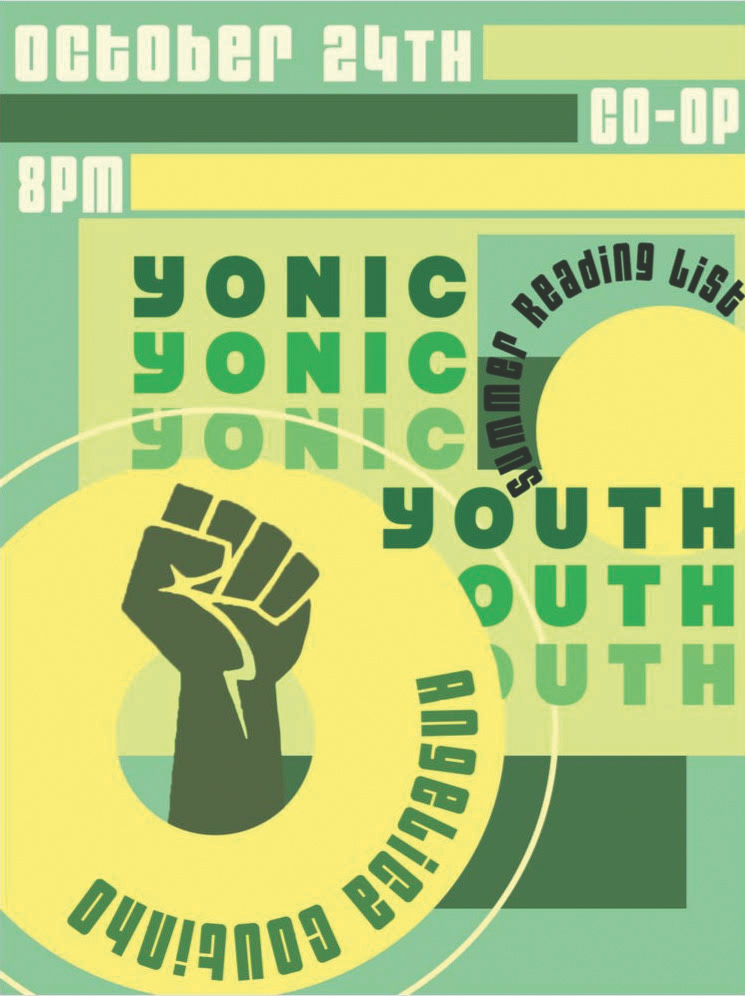
photo COURTESY OF Fred sciarappa ’22
On Thursday, Oct. 24, Hamilton’s first all-womxn student band Yonic Youth and opener Angelica Coutinho ’20 performed “Reclaiming Kirkland: A Concert” at the Co-Op. The concert’s mission was to reclaim the spirit of the historical Kirkland College, which has “driven the work of activists and marginalized people on this campus for decades” and inspired the members of Yonic Youth to “reclaim Hamilton’s music scene as one for womxn too,” the Facebook event noted.
The band played a variety of songs, many of them feminist or social justice-focused, including “To the Boys” by Molly Birch, “Came Out of a Lady” by Rubblebucket, and “I Gotta Know (Vajapple),” an original by the founding members of Yonic Youth.
Audience members expecting a typical rock concert were surprised to find a different scene: between songs, members of Yonic Youth asked for silence as they spoke about social issues surrounding “hegemonic power, oppression, marginalization, and empowerment.” In her opening statement, guitarist Sara Jhadbabie ’21 spoke on the necessity to acknowledge social problems that manifest even at Hamilton.
“We are going to talk about some things that don’t always get talked about on this campus: we want to talk about heteropatriarchy, white supremacy, inequality, power in this world. We’re speaking on behalf of our own experiences, but we cannot speak for others’ experiences.”
Sharing their personal stories, the members posited that social issues can present themselves even at liberal higher education institutions. Drummer Julia Opatrny ’20 spoke about her difficulty finding a space where her musical skills were valued rather than invalidated, as she felt they were by one of her male professors as well as by the historically male-dominated Jazz Band, in which she was the only female instrumentalist.
“Yonic [Youth] was the first place I felt welcomed as a woman and a musician on this campus,” she said.
Jhadbabie listed other injustices present at the College. “Let’s talk about how Hamilton has a culture of toxic masculinity. Let’s talk about how we have white supremacists on this campus. Let’s talk about the way our academic structures are racialized and gendered, the way Campo polices students of color, the way that the knowledge of women of color are erased in the histories we learn.”
Bassist Jane Taylor ’22 spoke of a traumatic experience: “Last year at Hamilton, I was drugged during the date-rape drug crisis. It was a hard experience because I felt powerless… I felt that Hamilton itself had abandoned me. The worst part of it was that the health center lost my test, so I’ll never have closure, I’ll never get to press charges if I want to, and I know that I’m not the only one that this has happened to — and that’s bullshit.
“It was also one of the nights that I felt the most loved, not only by my friends but also by random strangers who made sure that I was okay. I’m so grateful to those strangers, and that night I learned that we have to be there for each other. We have to help make a community of compassion and care and love, and it starts here,” Taylor continued.
The concert was a cathartic release for all involved: A tribute to the rich history of Kirkland College, reclaiming the College’s tradition of not only protest and frustration, but also love and empathy.
The audience was reminded that when the overwhelming injustice in the world can make us feel detached or numb, we must allow ourselves to be vulnerable and express our love.
“When we come together, when we feel love for each other, when we exercise compassion and empathy, we become the antithesis of hate and injustice,” said Jhadbabie.
This concert was not a standalone event. The organizers hope to continue the conversation beyond that single night. “I see our show as a way of bringing the activism [and] feminist spirit outside of a class setting, or specifically designated organized protests, and to an event people might less associate with resistance,” writes keyboardist Joyce Lee ’20.
“I encourage people who organize events on campus to think about the platform their events give them to connect with their audiences about values, whatever they may be,” Lee continued.
Other members of Yonic Youth included Isabel Royer ’20, on vocals, and Eliza Jones ’22, on trumpet.
